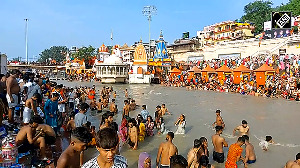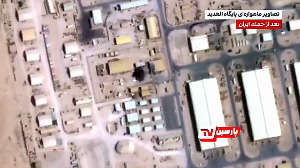Among the recipients of the Padma Shri -- India's fourth-highest civilian honor -- this year is Dr Joseph Hulse, a bio-chemist whose area of expertise is the life sciences, particularly relating to food, agriculture and agribusiness.
An avowed lover of India and an admirer of Mahatma Gandhi who visits India twice a year at his own expense, Dr Hulse has written extensively on sustainable development. His latest book, Sustainable Development at Risk, has been published by the Cambridge University Press, New Delhi. His earlier book, Sustainable Development: Learning from the Past, was published under auspices of the Indian Council of Scientific and Industrial Research in 2004.
Renowned agricultural scientist Professor M S Swaminathan calls Dr Hulse "the very embodiment of humanistic science and scientific humanism. What he says and does has the stamp of authority and credibility because it comes from his personal experience."
Dr Hulse was vice president of the International Development Research Center, established by former Canadian prime minister Lester Pearson. With offices in Singapore and New Delhi, the IDRC has supported more than 1,820 research projects directed and managed by Asian researchers and institutions.
Dr Hulse, a visiting professor at the Swaminathan Research Foundation in Tamil Nadu, the CFTRI and at the University of Manchester, chairs the International Committee on Integrated Food Systems for Sustainable Food Security.
He is the second Canadian to be awarded the Padma Shri, after former external affairs minister Flora McDonald -- who too has worked extensively in a number of India's rural communities.
He spoke to rediff India Abroad Senior Editor Ajit Jain in Toronto.
How did your association with India begin?
My association began in 1960. I have known Dr Swaminathan for over 30 years when he was the director of the Indian Agricultural Research Institute. My principal connection with India began when the [United Nations] Food and Agriculture Organisation was starting the Freedom from Hunger campaign. I was then director of research for Maple Leaf Mills in Toronto. That company doesn't exist any more. I was asked by my friends from FAO if we could help in the establishment of an international training center in Mysore.
The maharaja of Mysore, who became a great friend of mine, said his palaces could be used for this facility. I spoke about the Freedom from Hunger campaign with my friends in the food industry and they agreed to accept the work that became known as the Canada-Mysore project. I was asked to direct the Freedom from Hunger Campaign in 1961.
We got the support of NGOs [non-governmental organizations] and the presidents of 20 of the largest agro-food business companies. Together we raised close to $350,000 -- which would be equivalent to $3 million in today's money. That's how we established the Central Food Training Research Institute in Mysore where I am now the visiting professor. We have trained close to 8,000 people there, from 45 different developing countries, in food preservation.
You were invited to join Dr Swaminathan's research foundation?
Yes. He gave me the glorious title of distinguished visiting professor. I am with him ever since. We work together. We started working in Pondicherry and more recently in Kerala. We devoted a good deal of our work to elevation of malnutrition amongst the poor rural population. There are still 100 million people in rural India who are malnourished.
I am working closely with Dr Swaminathan and Dr Hanumappa Sudarshan, director of the Karnataka Health Task Force, an eminent physician and part of the Karuna Trust.
About 70 percent of rural Indians are considered malnourished. Hindustan Lever in Bangalore has started a program with UNICEF to elevate child malnutrition.
You were in India recently?
Yes. Dr Swaminathan, Dr Sudarshan, people from Hindustan Lever and Dr V Prakash -- director of the Central Food Research Technological Institute in Mysore, who has been the prime mover, wanted to expand the program.
Dr Sudarshan has designed small factories to provide employment to rural people. We all know that malnutrition is directly co-related to with poverty which is the result of unemployment. So, we have been promoting a series of bio-villages, which is to help poor people to improve their small-scale farming practices and to grow food for themselves and for the market.
Dr Swaminathan was in Canada recently. There was a discussion with him on why so many farmers in India are committing suicide.
That is because they are pushed into buying fertilizers and bio-fuel which is doing immense damage to small farmers. These in turn are pushing food prices and small farmers are suffering. Furthermore, bio-fuels are not energy efficient. You use more energy in producing ethanol.
If the prices of food products go up, should farmers not stand to gain?
We are talking about middlemen who provide them loans. They take away that profit. There are 11,000 odd farmers in Maharashtra who have committed suicide. Swaminathan is very concerned about this and we are trying to provide them with better employment possibilities. These small farmers are in the hands of seed, fertilizer and pesticide producers, who control them as they make them pay huge interests on loans. The fact also is the rural poor people are being sadly neglected.
Would you say it is because of globalisation, which has allowed multinationals to enter the agriculture business also?
Exactly, and the supermarkets like Wal-Mart are making it even worse. We know Wal-Mart has a foothold in India. They pay very low prices to farmers because they want to sell at low prices to the consumers.
Is India facing food shortage again?
Yes. There's also competition from China. China has become big producer of agricultural materials, food industry and also very big producer of processed food.
Why should China's entry into food production affect Indian farmers?
Dr Swaminathan and [the late] C Subramaniam were the founders and promoters of India's Green Revolution. Now the government of India seems to be neglecting agriculture and promoting information-technology, and money that IT is contributing to the Indian economy is being spent on armaments. If they spend a fraction of what they are spending on armaments on improving the lot of poor rural farmers, everybody would be much better off.
Are you saying the Indian government lacks sensitivity about the plight of the small farmers?
I believe it is so. They should be reminded that 70 percent of Indians live in rural communities. These people from rural areas who decide to move to urban areas only create trouble for themselves and for the environment. They move into slums of Mumbai and suffer immeasurably because they can't find employment and they live in terrible conditions. This is why we are doing our best to help the rural people to use their resources to their advantage.
Dr Sudarshan asked me, 'How do we get them employment?' I said if you look at the world, farming, anywhere, started with domestic crops. Foods were made in kitchens before they were made in factories. All of the food processes we use were known to the Harappan civilization, were known to the Babylonians, were known to the Egyptians, 6,000 to 8,000 years ago.
What is your advice for bettering the lot of India's rural poor?
I am working with Dr Swaminathan in Kerala. We are working with tribal people who live in the natural environment. The Western Ghats there is one of the six most diverse sources of bio-diversity in the world. They are developing medicinal plants, root crops and other products. I visit them each time I go to India. They are doing wonderful work. They teach poor people how to grow things they can sell. They have identified 60 medicinal plants, the extracts of which are registered and sold to the medical research council and elsewhere. These poor people need lots of opportunities. They don't make millions, but they make some money so that they can just get started.
Banking institutions in India are reportedly paying a lot of attention to small farmers, giving them loans etc?
They are only interested in working with big farmers. They are not reaching out to small farmers -- they are not interested in small farmers. Hindustan Lever has taken a lead by setting up primary food processing units in the rural communities. All foods and vegetables are very perishable. They perish if you don't do something to protect them soon after you harvest them.
When Ontario Premier Dalton McGuinty returned from his official visit to India in January 2006, he said 35 percent of fruits and vegetables are destroyed in India for limited refrigeration and processing facilities.
This 35 percent number has been kicked around for a long time. I am not sure if anybody knows. I don't know how you will define what you mean by spoilage. I recently did a survey of the Indian food industry with my colleagues at the CFTRI. Apart from the spice, tea and coffee industries, we found there's very little integration between farmers and processors. The [Indian] minister of food and agriculture also had a study done three years ago which said the same thing. There's sadly inadequate support to the small producers and processors. We are encouraging the producer to become a primary processor also in the rural areas. This is what Dr Swaminathan and Dr Sudarshan, the CFTRI and the Hindustan Lever are trying to do. India produces the best computer programmers in the world. Some of Dr Swaminathan's people in Pondicherry have now equipped each village with a computer and the computer is programmed. Even women who can't read and write can use these computers. They just have to click on a few buttons, and it will indicate the price and demands for their products.
Would you say they are becoming worldly wise and less vulnerable to exploitation?
Yes. With these computers they are connected to the market that they were not in the past. We have to do more.
How does being awarded the Padma Shri feel?
Well, I don't know! I suspect it has happened because of support from Dr Swaminathan and Professor N G K Menon [former Indian science and technology secretary and currently director, Indian Institute of Technology, Delhi]. I have known him for over 25 years.
India is obviously honoring you for all the work you have done there.
I am very honored. I haven't done what I have done to get any recognition. I received a notice from Indian high commissioner that I am going to receive the Padma Shri.
Will this recognition help you do more for India's poor farmers?
I don't think there's any money that comes with it. Whether it will have any effect -- it seems to me stories about helping poor people don't get as much attention in the media as Presidential races in the United States. In my book I have stated I don't consider the US a democracy, it is a plutocracy -- government by wealth. Hillary Clinton and others have to spend more than $100 million even to be nominated by their respective parties. How can you call it a democracy? The greatest saint to my mind who lived in the last millennium was Mahatma Gandhi. He is my greatest inspiration. I was born in a poor community, I know the life [of the poor].
You are obviously very attached to India.
I love that country. My friends, specially Professor M G K Menon, have been promising me for a long time to make me an honorary citizen of India. If it happens, that will be the greatest honour I will receive.





